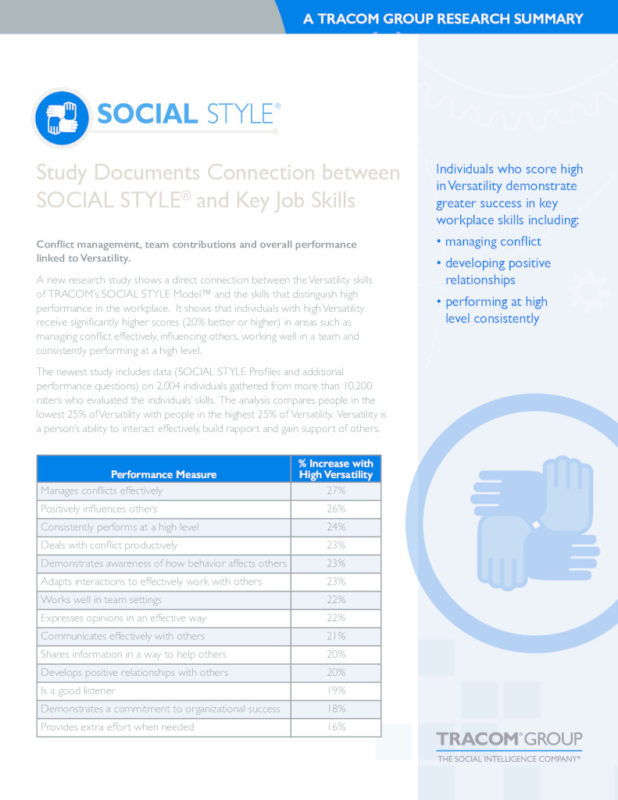A new research study shows a direct connection between the Versatility skills of TRACOM’s SOCIAL STYLE Model™ and the skills that distinguish high performance in the workplace. It shows that individuals with high Versatility receive significantly higher scores (20% better or higher) in areas such as managing conflict effectively, influencing others, working well in a team and consistently performing at a high level.
Versatility and Success
Individuals who score high in Versatility demonstrate greater success in key workplace skills including:
- managing conflict
- developing positive relationships
- performing at high level consistently
The findings showed that high Versatility was consistently related to other workplace performance skills for both groups. One interesting difference was that individual contributors with high Versatility received even better scores for “Managing Conflict Effectively” (30%) compared to low Versatility individuals than Managers with high Versatility (24%).
With the SOCIAL STYLEs assessment, you can observe a person and determine their preferences or Style. You can then use that information to moderate your behavior and make that person more comfortable. This is called Versatility. There are four SOCIAL STYLEs:
- Amiable Style: They openly display their feelings to others. They appear less demanding and generally more agreeable than others. They are interested in achieving a rapport with others who often describe them as informal, casual and easy going. To learn more about the Amiable Style person, click here.
- Driving Style: Seen as direct, active, forceful and determined, they initiate social interaction. They focus their efforts and the efforts of others on the goals and objectives they wish to get accomplished. To learn more about the Driving Style person, click here.
- Expressive Style: They tend to be more willing to make their feelings known to others. They can appear to react impulsively and openly show both positive and negative feelings. Typically, they’re described by others as personable, talkative and sometimes opinionated. To learn more about the Expressive Style person, click here.
- Analytical Style: They are typically described as quiet, logical and sometimes reserved or cautious. They tend to appear distant from others and may not communicate, unless there is a specific need to do so. To learn more about the Analytical Style person, click here.
Summary
Large organizations often invest in interpersonal skills training for development and growth, but may struggle to quantify the benefits. A study reveals that versatility is directly related to important skills like conflict management, team contributions, organizational commitment, and overall high performance. Organizations can implement SOCIAL STYLE and Versatility training with confidence, as it develops the skills needed for success. Social Style, used by millions, is the preferred choice for businesses worldwide, with multi-rater and self-perception assessments available in over 20 languages. Its profiles and training courses are available in various formats and durations, including specific assessments for managers and sales professionals.
Read next: Versatility Tips.
